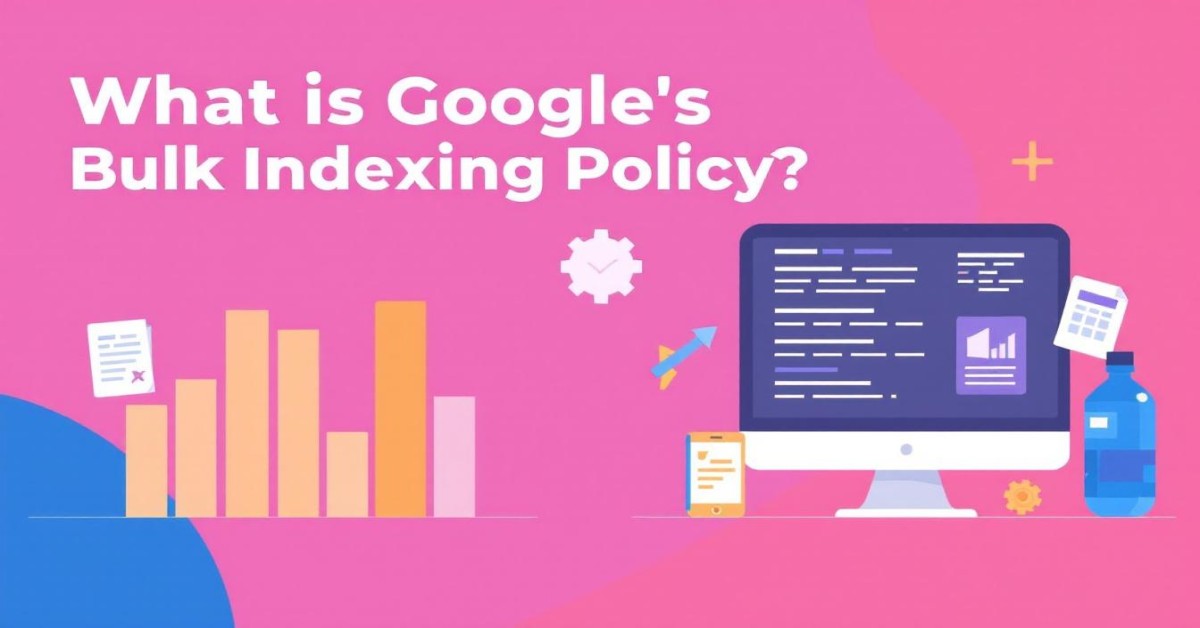In the digital age, visibility in search results is crucial for online success, pushing businesses and developers to prioritize effective search engine optimization strategies. At the heart of this endeavor lies the importance of understanding Google’s Bulk Indexing Policy. This policy dictates how Google indexes large volumes of web pages, influencing the digital landscape significantly. Comprehending this policy is essential for marketers and webmasters wanting to maximize their site’s visibility and operational efficiency. This article explores the intricacies of Google’s Bulk Indexing Policy, discussing its impact, best practices, and strategies to navigate potential challenges it presents to website managers.
Understanding Google’s Bulk Indexing Policy
Google’s Bulk Indexing Policy is a set of guidelines and practices that Google follows to determine how large volumes of web pages are indexed within its search engine. This policy impacts how quickly and efficiently websites with extensive amounts of content can be crawled and made available in search results. Understanding these guidelines is crucial for webmasters who manage significant online content volumes.
What Is Bulk Indexing?
Bulk indexing is the process of submitting a large number of web pages for inclusion in a search engine’s index at once. Rather than indexing pages individually or incrementally, bulk indexing allows for an expedited process which is particularly important for large websites. This method ensures that extensive content repositories can be efficiently processed and made searchable by users.
Why Does Google Implement a Bulk Indexing Policy?
Google implements a Bulk Indexing Policy to manage resources effectively while maintaining the quality of its search index. Ensuring quality is critical because rapid and large-scale content indexing can lead to inclusion of duplicate, thin, or low-value pages. Therefore, Google aims to balance speed and efficiency with the need to maintain a relevant and high-quality index.
How Does Google’s Bulk Indexing Policy Affect Websites?
The Bulk Indexing Policy affects how quickly new content from large websites appears in search results. Websites with frequently updated and voluminous content must ensure they meet Google’s technical requirements and content standards, such as having a clean and efficient sitemap, to be effectively indexed. Failing to adhere to these standards may result in slower indexing times or even reduced visibility in search results.
Key Components of Google’s Bulk Indexing Policy
1. Technical Optimization: Websites must be technically sound, ensuring fast loading times and minimal server errors. 2. Quality Content: Google favors websites that consistently provide valuable and original content. 3. Structured Data: Using structured data markup helps in understanding the page context, aiding in better indexing. 4. Sitemap Submission: A regularly updated and complete sitemap is crucial for helping Google understand the site structure effectively.
How to Optimize a Website for Bulk Indexing?
To optimize a website for bulk indexing, webmasters need to focus on: – Improving server performance: Ensuring servers can handle high traffic and frequent crawling by Googlebot. – Using canonical tags: This helps prevent duplicate content issues by specifying the preferred version of a web page. – Ensuring mobile-friendliness: With mobile-first indexing, having a mobile-optimized site is critical. – Implementing an SSL certificate: HTTPS sites are preferred by Google for better security and trustworthiness.
| Component | Importance |
|---|---|
| Technical Optimization | Essential for fast and efficient crawling |
| Quality Content | Vital for ensuring relevancy and value |
| Structured Data | Helpful for page context understanding |
| Sitemap Submission | Critical for informing Google about content structure |
Frequently Asked Questions
What is Google’s Bulk Indexing Policy?
Google’s Bulk Indexing Policy refers to the guidelines and methods established by Google that govern how large volumes of content or web pages are submitted, indexed, and ranked within Google’s search ecosystem. This policy aims to ensure the integrity and effectiveness of the indexing process, preventing malicious or manipulative tactics that could distort search results. It involves the careful prioritization of content based on quality and relevance to maintain the credibility of search results. Websites looking to have substantial amounts of content indexed must adhere to these guidelines to avoid penalties or reduced visibility in search results.
How does Google’s Bulk Indexing Policy impact website rankings?
The impact of Google’s Bulk Indexing Policy on website rankings is significant. Websites that attempt to index large quantities of content quickly must adhere to the policy’s guidelines to ensure they do not suffer negative consequences. The policy discourages practices like keyword stuffing or posting low-quality content in bulk to manipulate ranking algorithms. If these guidelines are not followed, websites may experience a decrease in visibility and ranking positions. Conversely, websites focusing on high-quality, relevant content that genuinely meets users’ needs are more likely to be rewarded with higher rankings over time.
What are the best practices for complying with Google’s Bulk Indexing Policy?
To comply with Google’s Bulk Indexing Policy, websites should adhere to best practices that emphasize quality over quantity. This includes creating unique, high-quality content that provides real value to users, optimizing technical aspects such as metadata and sitemaps, and ensuring the site is easily crawlable by search bots. Regularly updating content, maintaining fast page load times, and obtaining credible backlinks also enhance compliance with Google’s expectations. Additionally, websites should avoid any form of deceptive practices designed to artificially improve rankings, as these can lead to penalties.
Can violations of Google’s Bulk Indexing Policy lead to penalties?
Yes, violations of Google’s Bulk Indexing Policy can definitely lead to penalties. Google employs complex algorithms and manual review processes to identify websites that attempt to game the system through bulk submission of low-quality content or manipulation of ranking factors. Websites found in violation of these policies may face a reduction in search rankings, or in severe cases, removal from search results entirely. It’s crucial for webmasters to understand and respect these guidelines to maintain their site’s integrity and visibility within Google’s search ecosystem.

